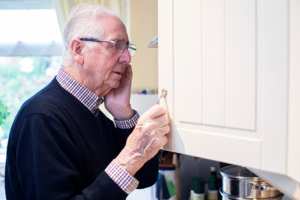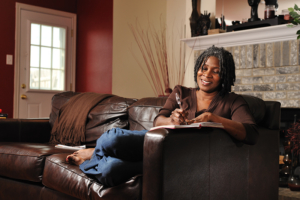Caregiver Tips for Dementia: False Accusations

These caregiver tips for dementia can help with one particular difficulty: false accusations.
It can come seemingly out of thin air: you place your loved one’s favorite tuna sandwich on the table – light on the mayo, no onions – something which typically brings her joy. But today, she pushes the plate away and will not take a bite, insisting that you’ve poisoned the meal.
Or, you have provided the senior with a meaningful activity that links her to a significant time in her past career, sorting paperwork. Out of the blue, she charges you with tampering with the documents in order to steal money from her bank account.
How can you most effectively diffuse situations like these dementia false accusations?
- Keep a controlled, gentle, understanding tone. It may be instinctive to be defensive and refute the accusation, but appropriate responses may include something such as, “I see that you are feeling afraid, but I will not let anything bad happen to you. Let’s enjoy this food together,” or, “Oh no, are you missing some money? The bank is not open at the moment, but let’s go there right away tomorrow to get it straightened out.”
- Move into a welcomed distraction. After sharing in the senior’s concern, transition into a pleasant topic or activity that your loved one likes, or move to another area. In the case of the suspected food poisoning, you could engage the senior in going to the kitchen and helping her prepare a fresh sandwich. If you’ve assured the senior that you will stop by the bank together tomorrow, a walk outside to look at the flowers and birds, or playing some favorite music, can help.
- Never argue or try to reason. These approaches very often escalate agitation in someone with dementia. It might take some time and experience to develop the approach that works best, and that strategy could need to change from one day to another. The goal is to stay calm, patient, and empathetic, validating the senior’s feelings and offering comfort.
Responsive Home Care’s home care experts are highly trained and experienced in effective, creative dementia care techniques, and can help with managing challenging situations and behaviors, enabling a senior loved one to experience a greater quality of life, and providing family caregivers with relief and peace of mind. Reach out to us today at 954-486-6440 for more information about our in-home care in Fort Lauderdale, FL and the surrounding area or to inquire about additional resources to help you better care for a senior loved one with Alzheimer’s.





 Taking care of a senior loved one with Alzheimer’s is a fluid, ever-evolving undertaking. One day may be calm and peaceful, with your parent enjoying activities, eating healthy meals, and sharing laughter with you; while the next day may be filled with agitation, anxiety, and sullenness. Exactly what will today bring?
Taking care of a senior loved one with Alzheimer’s is a fluid, ever-evolving undertaking. One day may be calm and peaceful, with your parent enjoying activities, eating healthy meals, and sharing laughter with you; while the next day may be filled with agitation, anxiety, and sullenness. Exactly what will today bring?